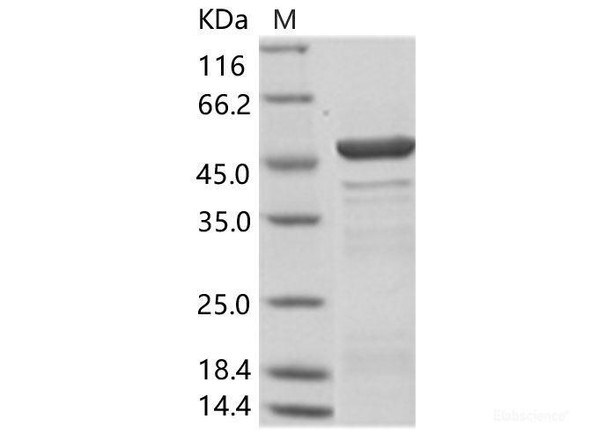Description
| Product Name: | HTNV Recombinant Protein |
| Product Code: | RPPB5512 |
| Size: | 0.5mg |
| Target: | HTNV |
| Synonyms: | HTNV, Hantaan Virus, Hantanvirus. |
| Source: | Escherichia Coli |
| Physical Appearance: | Sterile filtered colorless solution. |
| Formulation: | HTNV is formulated in 1xPBS pH-7.4 and 0.05 Sodium azide. |
| Stability: | Upon arrival, Store at -20°C.�Please avoid multiple freeze/thaw cycles. |
| Purity: | HTNV protein is >95% pure as determined by 12% PAGE (coomassie staining).� |
| Amino Acid Sequence: | GSMATMEELQREINAHEGQLVIARQKVRDAEKQYEKDPDELNKRTLTDRE GVAVSIQAKIDELKRQLADRIATGKNLGKEQDPTGVEPGDHLKERSMLSY GNVLDLNHLDIDEPTGQTADWLSIVVYVD |
Hantaviruses is part of the Bunyaviridae family of viruses. Hantaviruses are transmitted by aerosolized rodent excretia or rodent bites. The infection of Hantavirus is called hemorrhagic fever with renal syndrome (HFRS) relating with high mortality, and several other Hantaviruses are associated with the etiologic agents causing Hantavirus pulmonary syndrome (HPS) or Hantavirus cardiopulmonary syndrome (HCPS). Hantavirus infection increases vascular permeability and decreases blood pressure due to endothelial dysfunction, the most dramatic damage is seen in the kidneys, while lung, spleen, and gall bladder are most affected. Regions affected by HFRS include China, the Korean Peninsula, Russia, and northern and western Europe. Regions with the highest incidences of HPS or HCPS include Argentina, Chile, Brazil, the United States, Canada, and Panama. The agent causing HCPS in South America is Andes virus, one member of Hantavirus, which causes a person-to-person transmission, fatality rate, was reported about 25-35% in Argentina and of 37% in Chile.
The Hantavirus nucleocapsid (N) fusion protein is expressed in E. coli and is fused to 6xHis tag. Hantavirus nucleocapsid (N) is conserved among different strains, and is used to test the specific IgM and IgG to Hantavirus.










